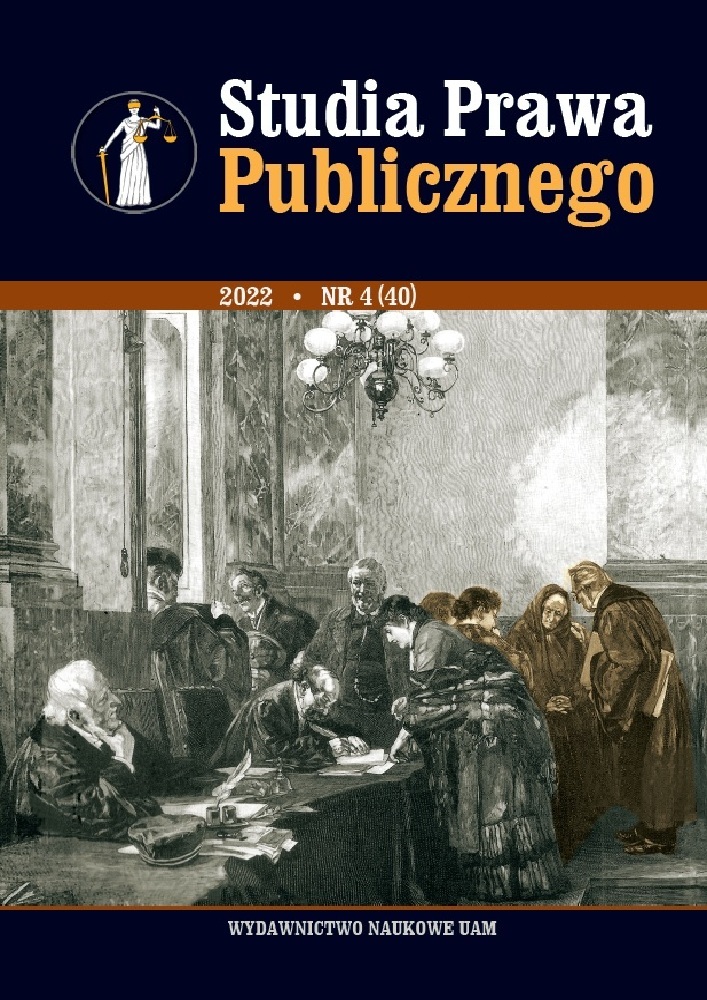Abstrakt
The text takes up the problem of the role of names in human life. The author refers to the identifying and ordering role of each person’s name in legal relations; she recognizes that the surname is a personal right and, moreover, that it is part of the marital status disclosed in marital status records. The surname also indicates the particular familylegal relationship of a person, both in terms of being married and being descended from certain parents.
The text relates first of all to the method of establishing the surname for a child coming from spouses, and then to the child’s situation in the face of their parents’ divorce and of using the possibility of returning to the surname before marriage. The choice of the child’s name is not arbitrary. The Act regulates in detail the method and timing of selecting a child’s name. As a rule, in the case of a spouse’s child, the child’s surname remains associated with the presumption of descent from the mother’s husband.
The article goes on to deal with the issue of the surname being changed by the parents following a divorce and the lack of influence of this decision on a change in the child’s surname. When a parent decides to return to their pre-marriage surname, they exercise their own right, the effects of which do not extend to the child.
The author analyzes the impact of changing the parent’s surname in connection with entering into a new marriage, as well as the admissibility of changing the surname under administrative procedure, extending these effects to the situation of the minor’s surname. The text indicates a number of factors from which the law makes it possible to change a child’s surname. In the discussion, the author comes to the conclusion that changing a surname in the administrative mode remains independent of the situations indicated in the Family Code, which means that it should take place only exceptionally and solely for important reasons.
Bibliografia
Beisert M., Strategie radzenia sobie z rozwodem rodziców podejmowane przez dzieci w wieku dorastania, „Dziecko Krzywdzone. Teoria, Badania, Praktyka” 2008, nr 7(4).
Buchalska J., Nazwisko jako przedmiot ochrony w prawie polskim, Warszawa 2015. Chwyć H., Zawarcie małżeństwa i jego rejestracja w prawie polskim. Poradnik dla kierowników Urzędów Stanu Cywilnego, Lublin 1999.
Gaffke A., Gaffke M., Vademecum kierownika urzędu stanu cywilnego, Warszawa 2019. Gajda J., Art. 59, w: Kodeks rodzinny i opiekuńczy. Komentarz, pod red. K. Pietrzykowskiego, wyd. 6, Warszawa 2020.
Gulczyński A., Nazwisko dziecka. Ewolucja ukazywania relacji rodzinnoprawnych, Poznań 2010.
Haberko J., Sytuacja prawna ojca dziecka przed i po urodzeniu, w: Pedagogika rodziny. Podejście systemowe, t. 3, Wychowanie do rodziny, pod red. M. Marczewskiego, Gdańsk 2018.
Krzemiński Z., Rozwód. Komentarz, orzecznictwo, piśmiennictwo, wzory pism, Kraków 2001.
Panowicz-Lipska J., Art. 23, w: Kodeks cywilny. Komentarz, pod red. M. Gutowskiego, t.1, wyd. 3, Warszawa 2021.
Pietrzykowski K., Art. 59, w: Kodeks rodzinny i opiekuńczy. Komentarz, pod red. K. Pietrzykowskiego, wyd. 6, Warszawa 2021.
Porembska M., Odolczyk K., Krzywdzenie emocjonalne dziecka w sytuacji konfliktu okołorozwodowego rodziców, „Dziecko Krzywdzone. Teoria, Badania, Praktyka” 2022, nr 21(2).
Radwański Z., Olejniczak A., Prawo cywilne – cześć ogólna, wyd. 15, Warszawa 2019. Sasiak J., Art. 59, w: Kodeks rodzinny i opiekuńczy. Komentarz, pod red. M. Habdas, M. Frasa, Warszawa 2021.
Smyczyński T., Prawo rodzinne i opiekuńcze, wyd. 9, Warszawa 2018.
Sokołowski T., Art. 59, w: Kodeks rodzinny i opiekuńczy. Komentarz, pod red. H. Doleckiego, T. Sokołowskiego, wyd. 2, Warszawa 2013.
Strzebinczyk J., Nazwisko członków małej rodziny (według przepisów kodeksu rodzinnego i opiekuńczego), w: Kodeks rodzinny i opiekuńczy po nowelizacji, pod red. J. Mazurkiewicza, Wrocław 2010.
Sylwestrzak A., Art. 90, w: Kodeks rodzinny i opiekuńczy. Komentarz, pod red. H. Doleckiego, T. Sokołowskiego, wyd. 2, Warszawa 2013.
Trocha O., Przemoc psychiczna wobec dziecka – aspekty prawne, „Dziecko Krzywdzone. Teoria, Badania, Praktyka” 2011, nr 10(4).
Tunia A., Czynności kierownika urzędu stanu cywilnego podejmowane przed zawarciem małżeństwa w formie wyznaniowej, „Studia z Prawa Wyznaniowego” 2005, t. 8. Wicherek P., Art. 59, w: Kodeks rodzinny i opiekuńczy. Komentarz, pod red. M. Habdas, M. Frasa, Warszawa 2021.
Włodarczyk J., Przemoc wobec dzieci, „Dziecko Krzywdzone. Teoria, Badania, Praktyka” 2017, nr 16(1).
Żaczkiewicz-Zborska K., Zmiana nazwiska dziecka po rozstaniu rodziców, https://www.prawo.pl/prawo/zmiana-nazwiska-dziecka-warunki-i-problemy-po-rozwodzie,501257.html (dostęp: 13 IX 2022).
Licencja
Prawa autorskie (c) 2022 Joanna Haberko

Utwór dostępny jest na licencji Creative Commons Uznanie autorstwa – Użycie niekomercyjne – Bez utworów zależnych 4.0 Międzynarodowe.

